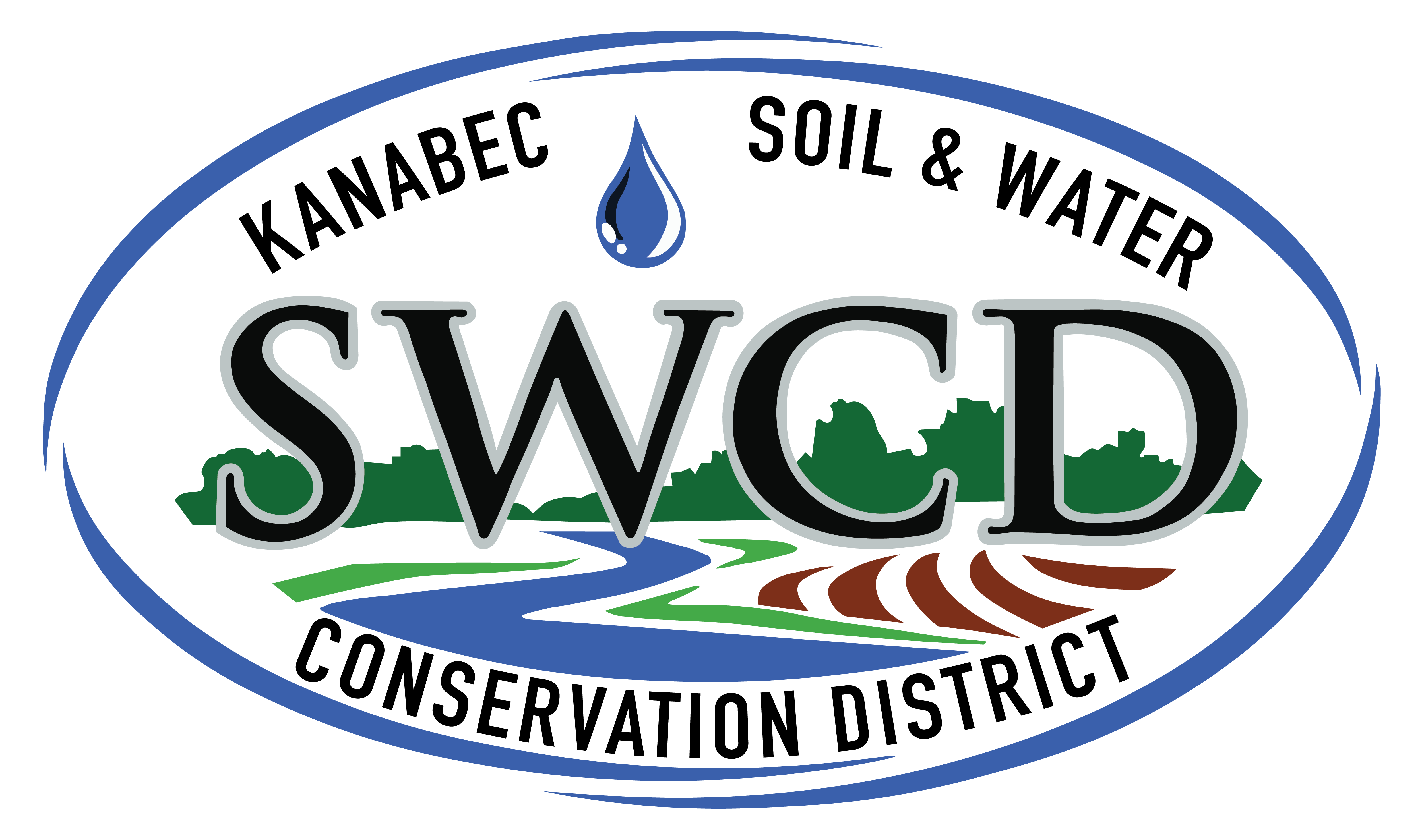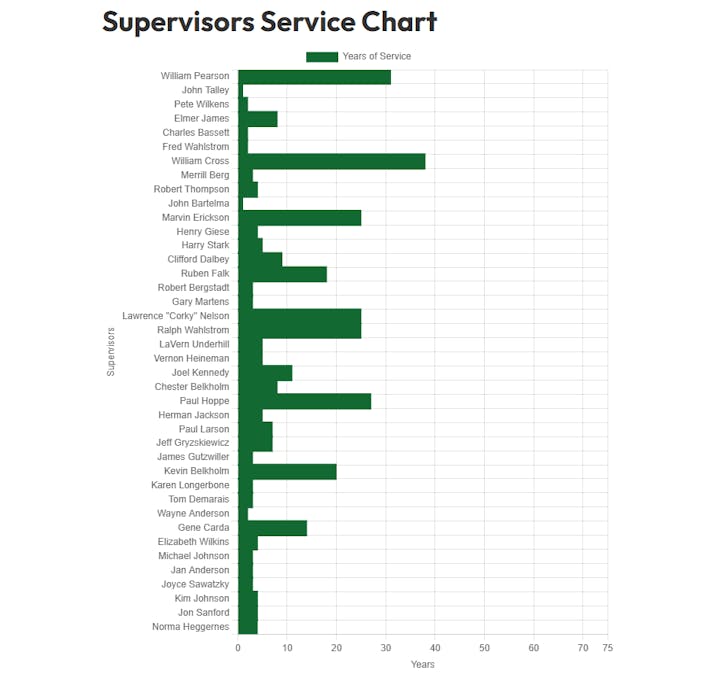Board of Supervisors Overview
The Kanabec Soil and Water Conservation District is a subdivision of state government, operating under a charter issued by the Secretary of State in 1950. It is governed by a five-member board of supervisors who are responsible for its activities. Supervisors are elected on the day of the regular general election. Incumbants terms terminate on December 31 and successors begin holding office on January 1. Mid-term vacancies are filled by appointment by the Board of Supervisors. Supervisors may serve any number of terms.
Supervisor Roles and Responsibilities
There are two key aspects to the role of a supervisor on an SWCD board: policy development and annual and long-range plans and budgets.
Policy Development
The SWCD board of supervisors is a policy board, meaning that its primary focus is not on running the day-to-day activities of the SWCD, but on setting overall policy and long-term objectives. The staff then uses these policies and objectives to ensure that the SWCD is proceeding in the general direction laid out by the board.
Board policy is a key element in the smooth operation of the SWCD. The board should develop policies on items ranging from expenditure of cost-share funds to the election of officers. Do not wait until a situation arises requiring a policy; develop a policy beforehand so that guidelines are available if a question is raised. (See box on the previous page for examples of the types of things for which policies should be developed.)
Although it is the board’s responsibility to develop policy and the staff’s responsibility to implement it, you will find that the fairest and most useful policies are developed with the help of significant staff input.
Planning and Budgets
Because board members focus on long-range objectives and goals, one of the most important parts of your job is developing your SWCD’s plans. Plan types include annual or biennial plans and budgets, comprehensive plans, water plans, etc.
Supervisors must be involved in all aspects of plan development and implementation, particularly in determining the long-term objectives of the SWCD. When working on the annual and long-range plans, supervisors should take a strong leadership role in the following areas:
- Definition of purpose: Supervisors must determine the purpose of the SWCD in the community.
- Prioritization of resource problems: Supervisors must decide which resource problems the SWCD will address and their relative importance. Supervisors should look at the big picture and develop broad policies that address the resource as a whole in their SWCD area. Staff can work within these broad policies to address individual concerns.
- Development of objectives: Supervisors must adapt the objectives they feel the SWCD should pursue to meet the resource needs of the SWCD area.
- Determination of actions: Supervisors must outline the actions to be taken by the board and staff to carry out their stated objectives. These actions should be consistent with their stated purpose and will result in a more effective conservation program.
- Adoption of plan: The board must formally adopt the plan. To achieve full participation in the planning process by both board and staff, a planning committee may be formed to develop the plan for recommendation to the board. The chair may appoint one or two board members to work with staff to develop the plan.
All plans and budgets should be reviewed on a regular basis to determine if goals are being achieved. The stated goals can be compared with actual performance and dollars available. Supervisors can use this information to decide what changes, if any, may be necessary to keep the SWCD on track.
Training and Leadership Opportunities
As a supervisor, you need orientation and ongoing training to perform your duties effectively. The Minnesota Association of Soil and Water Conservation Districts (MASWCD) offers the Leadership Institute that provides individuals with skills to excel as leaders in conservation.
Training can also be provided by the SWCD manager or staff. In this case, the National Association of State Conservation Agencies or NASCA, has a training checklist available. Each supervisor should have a training plan, which is reviewed and updated regularly.
Board Officers
The supervisors shall elect or appoint officers for the SWCD and the SWCD board (MINN. STAT. 103C.321 (2018)). A chair of the SWCD board shall be elected from its own members. A secretary and a treasurer shall be appointed who need not be members of the board. Officers shall have the powers and duties incident to their respective offices, and other powers and duties expressly prescribed by law or directed by the SWCD board.
Chair
The chair is the steering mechanism of your SWCD. It is up to the chair to do that little extra to motivate board members and other public-minded individuals to do what they can to assist in serving the present and future citizens of the SWCD. After receiving a few years of board experience, a supervisor should welcome the opportunity to be chair of the board. It provides an opportunity to become more closely involved and gain a broader perspective of the total program and its purpose.
Specific responsibilities of the chair are to:
- Preside at all meetings.
- Call special meetings when necessary.
- Meet with SWCD manager and heads of other agencies involved at least two weeks prior to the scheduled meeting to develop and/or discuss agenda items. This can be done by a short office visit and perhaps a few telephone calls. A formal meeting may not be necessary.
- Refer regularly to the long-range goals of the SWCD and the SWCD annual plan of work and operations when preparing the agenda, trying to ensure that all planned activities are addressed.
- Make sure a copy of the agenda, minutes of the previous meeting, and a financial statement (at a minimum) are sent to each board member at least a week prior to the meeting.
- See that agendas and pertinent material are sent to all individuals who should attend the meeting and take part in the discussion.
- Keep in contact with other supervisors on the progress of various programs delegated. Insist on regular attendance of supervisors.
- Call meeting to order promptly and at the specified time. Follow proper rules of order for a business meeting. A well-planned meeting should take no longer than two hours.
- Recognize visitors and other individuals present at the board meeting.
- Assume the role of facilitator. This will encourage all supervisors to participate in discussion of existing issues.
- Complete an item of business in the order listed before taking up the next item. Stick to the agenda.
- Utilize special committees to involve individuals other than board members and require committee reports at board meetings.
- Avoid the "rubber stamp approach." Encourage board members to question staff or individual presenters regarding clarification of a specific point, thus, allowing them to draw conclusions to adequately make their own decisions.
- Adjourn meeting promptly after all business has been completed.
Vice Chair
The vice-chair position becomes most important in the absence of the chair. The vice-chair should note the activities of the chair and how they are carried out, in case it is ever necessary for the vice-chair to chair a meeting.
Specific duties of the vice-chair are to:
- Assume the duties of the chair in the absence of the chair.
- Assist in organizing and implementing the SWCD program.
- Oversee the work of committees and coordinate their reports as delegated by the chair.
- Be familiar enough with the total program of the SWCD to be able to work closely with the chair and fill in when necessary.
Secretary
The primary responsibility of the SWCD board secretary is to arrange for the recording of official proceedings of the board and to see that the entire board approves the minutes as the legal record of the SWCD. As elected officials using public funds, these minutes should then be signed, becoming the permanent record of what is done and why. Copies for general information purposes should be forwarded to the area and central office of BWSR. They can also be sent to other interested organizations: the local chapter of the employees association, other state agencies, etc.
Specific duties of the secretary are to:
- Make a complete record of all proceedings.
- Indicate date and place of meeting, refer to whether it is a regularly scheduled meeting or a special meeting, official presiding, names of all those present including visitors, organizations represented, and names of supervisors absent.
- Record each motion in full.
- Complete action on each item of business so that a record can be made of what was addressed and completed.
- Initiate correspondence on behalf of the board as the need arises.
- Inform the chair of any business that should come before the board.
- Sign the official copy of the board minutes after approval by the board at the next meeting and see that the chair does likewise.
Treasurer
The SWCD treasurer is responsible for the financial matters of the SWCD, including the financial records. The treasurer co-signs SWCD fund checks and special fund vouchers after approval of the board. The treasurer and secretary should be bonded. In many cases, the two SWCD staff are also bonded to handle payroll and miscellaneous items. This is a convenience for the staff and allows for day-to-day activities to be conducted smoothly. The secretary and officer positions can be combined if the role is being filled by a supervisor.
Specific duties of the treasurer are to:
- Maintain complete and accurate records of receipts and expenditures. Include SWCD staff's program records and trial balance.
- Be prepared to answer questions from other board members regarding monthly and/or quarterly financial statement as well as year-end figures.
- Pay bills approved by the board and issue receipts for incoming funds or designate staff to do so.
- Make sure program records and general journal provides for adequate number of accounting categories to handle all general and special-use programs.
- Assure that all bills authorized for payment by the SWCD board are recorded in the minutes of the meeting.
- Work with the SWCD staff to develop a fiscal year budget.
- Arrange for surety bonds covering appropriate SWCD supervisors and staff.
Public Relations and Information (PR&I)
The PR&I officer serves as the liaison between the SWCD and the public. This person works with the media and other community organizations, such as schools, to educate the public about natural resources and the activities of the SWCD.
Information on this page has been provided courtesy of BWSR.



